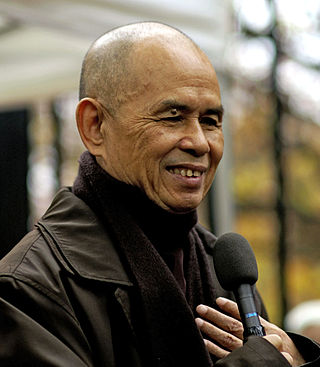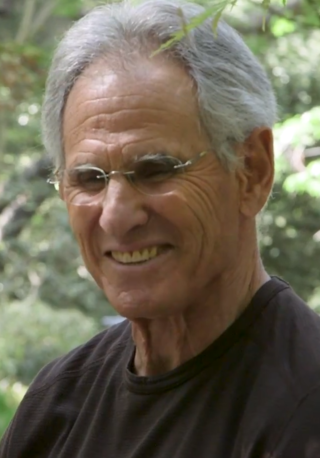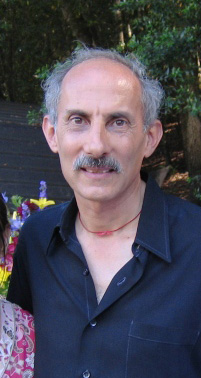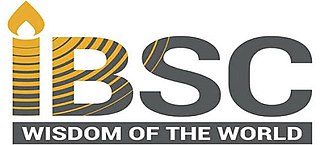
Meditation is a practice in which an individual uses a technique – such as mindfulness, or focusing the mind on a particular object, thought, or activity – to train attention and awareness, and achieve a mentally clear and emotionally calm and stable state.

Thích Nhất Hạnh was a Vietnamese Thiền Buddhist monk, peace activist, prolific author, poet and teacher, who founded the Plum Village Tradition, historically recognized as the main inspiration for engaged Buddhism. Known as the "father of mindfulness", Nhất Hạnh was a major influence on Western practices of Buddhism.

Phra VisuddhisamvaratheraAM, known as Ajahn Brahmavaṃso, or simply Ajahn Brahm, is a British-born Theravada Buddhist monk. Currently, Ajahn Brahm is the abbot of Bodhinyana Monastery in Serpentine, Western Australia; Spiritual Adviser to the Buddhist Society of Victoria; Spiritual Adviser to the Buddhist Society of South Australia; Spiritual Patron of the Buddhist Fellowship in Singapore; Patron of the Brahm Centre in Singapore; Spiritual Adviser to the Anukampa Bhikkhuni Project in the UK; and Spiritual Director of the Buddhist Society of Western Australia (BSWA). He returned to the office on 22 April 2018 after briefly resigning in March, following a contentious vote by members of the BSWA during their annual general meeting.
Mindfulness is the practice of purposely bringing one's attention to the present-moment experience without evaluation, a skill one develops through meditation or other training. Mindfulness derives from sati, a significant element of Hindu and Buddhist traditions, and is based on Zen, Vipassanā, and Tibetan meditation techniques. Though definitions and techniques of mindfulness are wide-ranging, Buddhist traditions explain what constitutes mindfulness such as how past, present and future moments arise and cease as momentary sense impressions and mental phenomena. Individuals who have contributed to the popularity of mindfulness in the modern Western context include Thích Nhất Hạnh, Herbert Benson, Jon Kabat-Zinn, Richard J. Davidson, and Sam Harris.

Buddhist meditation is the practice of meditation in Buddhism. The closest words for meditation in the classical languages of Buddhism are bhāvanā and jhāna/dhyāna.

Jon Kabat-Zinn is an American professor emeritus of medicine and the creator of the 'Stress Reduction Clinic' and the 'Center for Mindfulness in Medicine, Health Care, and Society' at the University of Massachusetts Medical School. Kabat-Zinn was a student of Zen Buddhist teachers such as Philip Kapleau, Thich Nhat Hanh, and Seung Sahn, and a founding member of Cambridge Zen Center. His practice of hatha yoga, Vipassanā and appreciation of the teachings of Soto Zen and Advaita Vedanta led him to integrate their teachings with scientific findings. He teaches mindfulness, which he says can help people cope with stress, anxiety, pain, and illness. The stress reduction program created by Kabat-Zinn, mindfulness-based stress reduction (MBSR), is offered by medical centers, hospitals, and health maintenance organizations, and is described in his book Full Catastrophe Living.
In Buddhism, kammaṭṭhāna is a Pali word which literally means place of work. Its original meaning was someone's occupation but this meaning has developed into several distinct but related usages all having to do with Buddhist meditation.
The Vipassanā movement, also called the Insight Meditation Movement and American Vipassana movement, refers to a branch of modern Burmese Theravāda Buddhism that promotes "bare insight" (sukha-Vipassana) to attain stream entry and preserve the Buddhist teachings, which gained widespread popularity since the 1950s, and to its western derivatives which have been popularised since the 1970s, giving rise to the more dhyana-oriented mindfulness movement.

Jack Kornfield is an American writer and teacher in the Vipassana movement in American Theravada Buddhism. He trained as a Buddhist monk in Thailand, Burma and India, first as a student of the Thai forest master Ajahn Chah and Mahasi Sayadaw of Burma. He has taught mindfulness meditation worldwide since 1974. In 1975, he co-founded the Insight Meditation Society in Barre, Massachusetts, with Sharon Salzberg and Joseph Goldstein, and subsequently in 1987, Spirit Rock Meditation Center in Woodacre, California. Kornfield has worked as a peacemaker and activist, organized teacher trainings, and led international gatherings of Buddhist teachers including the Dalai Lama.
Mindfulness-based cognitive therapy (MBCT) is an approach to psychotherapy that uses cognitive behavioral therapy (CBT) methods in collaboration with mindfulness meditative practices and similar psychological strategies. The origins to its conception and creation can be traced back to the traditional approaches from East Asian formative and functional medicine, philosophy and spirituality, birthed from the basic underlying tenets from classical Taoist, Buddhist and Traditional Chinese medical texts, doctrine and teachings.
Joseph Goldstein is one of the first American vipassana teachers, co-founder of the Insight Meditation Society (IMS) with Jack Kornfield and Sharon Salzberg, a contemporary author of numerous popular books on Buddhism, a resident guiding teacher at IMS, and a leader of retreats worldwide on insight (vipassana) and lovingkindness (metta) meditation.

Bruce Alan Wallace is an American author and expert on Tibetan Buddhism. His books discuss Eastern and Western scientific, philosophical, and contemplative modes of inquiry, often focusing on the relationships between science and Buddhism. He is founder of the Santa Barbara Institute for Consciousness Studies.
Samatha, "calm," "serenity," "tranquillity of awareness," and vipassanā, literally "special, super, seeing ", are two qualities of the mind developed in tandem in Buddhist practice.
Headspace, a subsidiary of Headspace Health, is an English-American online company, specializing in meditation. It was incorporated in May 2010 in London, England, by Andy Puddicombe and Richard Pierson. It is headquartered in Santa Monica, California, with offices in San Francisco and London.

Bhante Vimalaramsi was an American Buddhist monk and Abbot of the Dhamma Sukha Meditation Center in Annapolis, Missouri.

International Buddhist Studies College(IBSC) is a graduate college of Mahachulalongkornrajavidyalaya University in Wang Noi District, Phra Nakhon Si Ayutthaya Province, Thailand. IBSC was established in order that students from all over the world, who are interested in Buddhism, will be provided with an opportunity to pursue research in Buddhist studies.
The Plum Village Tradition is a school of Buddhism named after the Plum Village Monastery in France, the first monastic practice center founded by Thích Nhất Hạnh. It is an approach to Engaged Buddhism mainly from a Mahayana perspective, that draws elements from Zen and Theravada. Its governing body is the Plum Village Community of Engaged Buddhism.

Mindful Yoga or Mindfulness Yoga combines Buddhist-style mindfulness practice with yoga as exercise to provide a means of exercise that is also meditative and useful for reducing stress. Buddhism and Hinduism have since ancient times shared many aspects of philosophy and practice including mindfulness, understanding the suffering caused by an erroneous view of reality, and using concentrated and meditative states to address such suffering.

Prudence Margaret Burch, known professionally as Vidyamala Burch, is a mindfulness teacher, writer, and co-founder of Breathworks, an international mindfulness organization known particularly for developing mindfulness-based pain management (MBPM). The British Pain Society has recognized her "outstanding contribution to the alleviation of pain", and in 2019, 2020, 2021 and 2022 she was named on the Shaw Trust Power 100 list of the most influential disabled people in the UK. Burch's book Mindfulness for Health won the British Medical Association's 2014 Medical Books Award in the Popular Medicine category.
Mindfulness-based pain management (MBPM) is a mindfulness-based intervention (MBI) providing specific applications for people living with chronic pain and illness. Adapting the core concepts and practices of mindfulness-based stress reduction (MBSR) and mindfulness-based cognitive therapy (MBCT), MBPM includes a distinctive emphasis on the practice of 'loving-kindness', and has been seen as sensitive to concerns about removing mindfulness teaching from its original ethical framework. It was developed by Vidyamala Burch and is delivered through the programs of Breathworks. It has been subject to a range of clinical studies demonstrating its effectiveness.














